A group of children, ranging from 9 to 10 years old, huddle around a boy. It’s 2003, and the boy is telling them all their assignments for recess. Today’s game is Halo. The boy, obviously the leader in one respect or another, has decided he’s going to be Master Chief. He then offers up other SPARTAN IIs or Marines of Note to the other children.
10 year old me walks up to this group of children—all boys except for my twin sister. I’m holding a book, which I hand off to Chief in exchange for the last in the series. Once the transaction is complete, he asks if I want to play with “his unit” today. And, if I do, I needed to be a character from Halo. I contemplate this offer for a moment, stare down at the book in my hand (Halo: First Strike) and ask:
“Can I be Cortana?”
Chief smiles at me–the last time he will this recess, because he’s about to get into character–and says:
“Lead the way.”
I think some of the people who know me now would be surprised if I told them that Final Fantasy VII and Kingdom Hearts weren’t the reason I got into video games. Most people I know are aware of my love of JRPGs and my devotion to knowing as much about FFVII as I possibly can. Those same people also know I’m fucking awful at first-person shooters. Something about depth perception and not having it.
However, I give Halo credit for sending me down the path to being someone who plays games. At least, Halo was the first universe I became totally immersed in. My falling down the SquareSoft/Square Enix rabbit hole didn’t happen until three to five years after I first held Halo: Fall of Reach.
Oh, yeah…my first foray into the Halo series was by book.
You see, in my house, little girls didn’t play video games. I’m being a little tongue-in-cheek, because there were always exceptions (Pokémon, Mario Party, Diddy Kong Racing, Myst, Diablo, later Animal Crossing and Legend of Zelda…don’t ask me how I got away with Diablo; to this day I still don’t know), but for the most part, the gaming systems were my brother’s domain. I had to find another way into the media. So I did—in the form of my sister’s group of friends and a book series based on Halo: Combat Evolved.
I’m a reader by nature–probably feeds into my love of JRPGs and RPGs in general—and a sucker for anything with a moderately good plot. I devoured the Halo books. And, while to most people, Sierra 117: Master Chief is the main character, I saw something slightly different.
So, by the time that Halo 2 came out and found its way into my brother’s hands, I was ready, caught up, and couldn’t wait to watch. Because I was ready to see my favorite—and, in my opinion, the main—character animated.
I was ready for Cortana.
Flash forward about 12 years and you have me sitting on the couch next to a good friend. My partner’s on the other couch. They’re loading up Halo 4 for me. Already I’m tripping nostalgia, thinking about the ending of Halo 3 and Chief and Cortana’s last journey. My partner and our friend, however, have already warned me that 343 Industries’ Halo 4 is not going to make me happy.
We’re not two minutes into the game before I know they’re right.
“Oh god,” I say, my voice shaking with betrayal and rage. “What did they do to Cortana?!”
She means a lot to me. Has for over 13 years. Cortana—both in the books and the first three Halo games—taught me so much. Like how to be a strong character, and how not to take shit from anyone (looking at you, Giant Space Spinach). And that you can make sacrifices for people you care about, and sometimes saving your friends is enough.
Cortana also started a thought process that wouldn’t fully be realized until I saw her in Halo 4. She presents an interesting conversation about female-bodied people—or constructs, in her case—and the idea that they are objects.
And yes, I know. Technically, Cortana is an object. A smart, military grade AI that plugs into the back of Master Chief’s helmet. Made to monitor the SPARTAN IIs, specifically their most promising candidate. Yet, Chief never refers to her as an object, and treats her as another (if infinitely more useful) person. And it’s interesting to see the group of people who think of her as a person vs an asset.
Spoiler alert: the people I like the most in the Halo series are the ones who treat Cortana as a person.
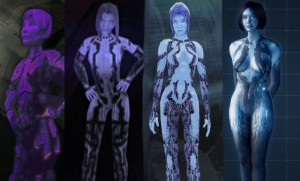
There were other things about Cortana that appealed to the gender-dysphoric me. While Cortana was quite slender and kind of shapely, she wasn’t described as or portrayed super busty. At least not compared to other characters I’d seen to that point. She had a more utilitarian design,which made sense, as she picked that upon her own creation. Short hair, sensible posing, lots of sass. Even as graphics got better, she didn’t change too much. I kind of had the same body shape. It’s silly to say, but when I started struggling with dealing with puberty and getting made fun of because of my small boobs in middle school, I always thought back to Cortana. Remember, I’d tell myself she picked that form and was happy with it. So I could be too.
That said, I can acknowledge that Cortana has a lot of conventional beauty, effectively runs around naked all the time and is totally a McGuffin sometimes. I’m not completely blinded by hero worship here.
I could probably go on for hours about what bullshit Halo 4 is. Solid gameplay, really pretty, total bullshit. It’s like someone used Sparknotes to build a Wikipedia page and didn’t bother to do research to fill in the gaps, so they just retconned things in.
There’s a lot of things in that game I won’t forgive 343 for, but what they did to Cortana is the highest sin for me. Suddenly, she’s got giant boobs that become the center of attention most of the times she’s in the shot. Suddenly, she’s this total damsel in distress. And while some of her sass and awesome moments are there, she’s been horribly reduced to an object.
Her thinking herself to death—the rampancy—that’s all been an inevitability since the beginning. It’s what happens. And I don’t blame Chief for wanting to stop that—hell, after 8 years of having someone in my head, I’d be pretty keen on them not leaving too. She’s probably the only friend he’s got left. That’s fine, I get that.
But even in the worst of times, Cortana was never…weak. Vulnerable, yes. Made the wrong decision? It happens. Afraid? Sure! But never weak. Never powerless and shoehorned to stay that way. Cortana has faced death so many times, in so many ways. Verses the Halo data and overloading her systems, verses the Gravemind, verses Covenant AI. Effectively “dying” of old age should come as a surprise, sure, but nothing she wasn’t prepared for.
She was Chief’s equal, in my opinion. And they kind of reduced her to Chief’s sex object. And everything about that is just not okay.
One big complaint I had about the Halo series as a whole is that strong, interesting female characters all had limited lifespans. Miranda Keyes, Sgt. McKay from the books, all the female SPARTANS, Carol “Foe Hammer” Rawley, Dr. Tilson,…none of them made it. Of all the female characters I can remember, I think they have only kept Dr. Halsey alive to date. Oh and Palmer. Who was in the game for like…3 minutes, excluding her time in Spartan Ops.
And sure, we had a list of tragic male deaths too (Johnson, why?!), but I learned to never be shocked when yet another woman fell in the series.
I’d hoped that maybe Cortana would fair better. That she wouldn’t be burned to keep Chief warm, wouldn’t be reduced to another batch of fodder to keep him going, but in the end, even she wasn’t saved.
And, after finishing Spartan Ops and reading the synopsis of Halo 5, I…honestly, I should have stopped at Halo 3. It really ended better that way. Halo 3 was the end of the series. They told us to finish the fight and we did. The Covenant dissolved, Earth was saved, and the plot wrapped up. Chief won, we won.

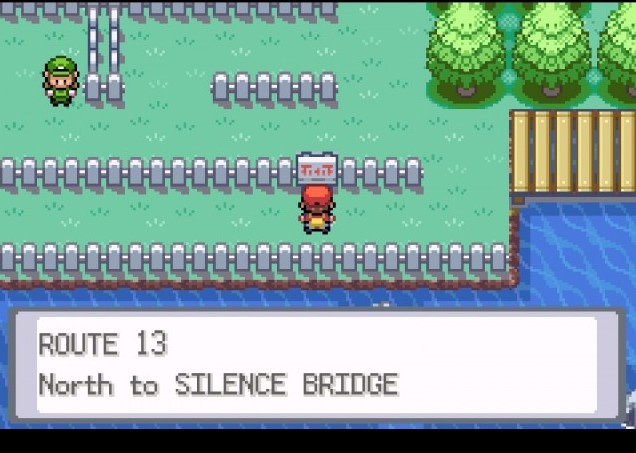
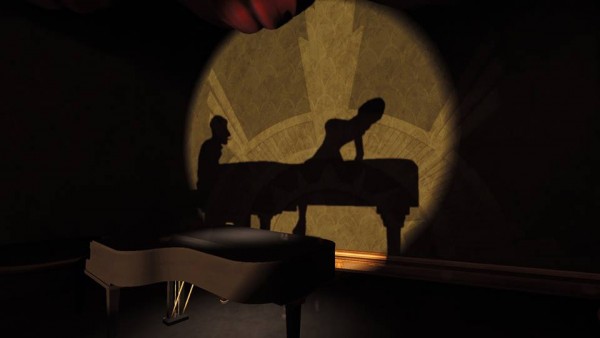
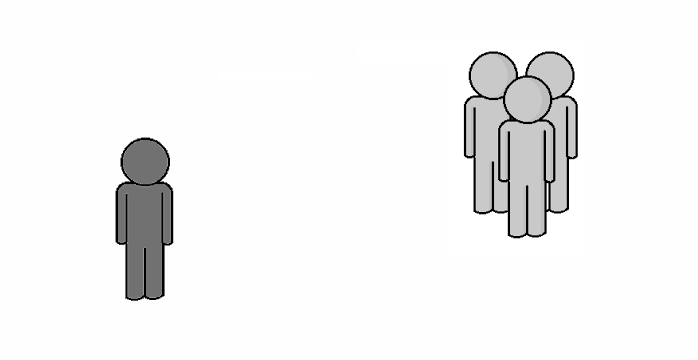
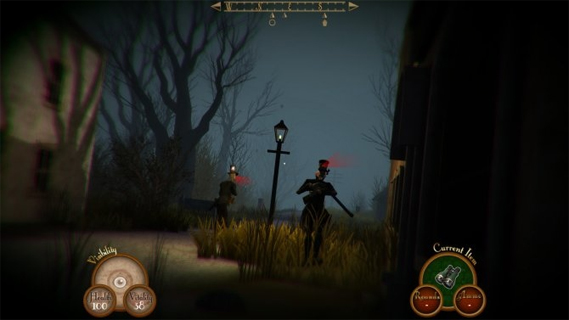
2 thoughts on “Cortana Through the Ages”
Not looking forward to Halo 4….Thanks 😉 Though there’s a reason I haven’t finished it or really progressed passed the first mission….lack of interest. Halo 3 offered solid closure…something Mass Effect 3 didn’t have on tap.
I really liked the end of Halo 3. I thought it was solid, and left us in a good place. Halo 4–my complaints about Cortana and 343 aside–seemed entirely unnecessary.
Sorry to say, it never really got better from that first mission, and you aren’t missing much.